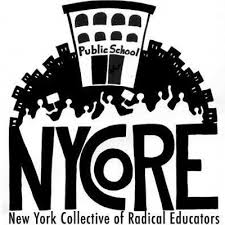Reflections from the annual conference of New York Collective of Radical Educators
Before I even sat down for my first workshop at the 2016 New York Collective of Radical Educators (NYCoRE) conference, I knew I would be leaving reinvigorated. The keynote speaker of the seventh annual NYCoRE conference, themed “Fight the Power” was Dr. Bettina Love. She set the tone for a highly engaging day of learning and organizing around social justice and education.
Dr. Love’s address was one of those where you find yourself just nodding along furiously and shouting, “Yes!” every other minute. I strongly encourage you to watch it for yourself.
Reflecting on the NYCoRE conference, which offered almost a hundred different workshops and hosted dozens of social justice education organizations, I was struck by the diverse array of causes and pedagogies championed in the fight for equity.
From combating Islamophobia to teaching sex-positive, LGBTQ sex education, clearly there are many ways to “fight the power”. Here are few ideas I’m leaving with.
1. Name “the power”
In order to “fight the power” we must name it. In this country that power has many names — hetero patriarchy, sexism, homophobia, Christian hegemony, racism — and while they are different they are also intertwined. Too often out of politeness or fear, we fail to name the systems of oppression that make up “power”. Sometimes the simplest act of resistance is calling something out for what it is. In classroom this can take several forms.
Firstly, I have to name whiteness and my own white identity. I find that many of my students come into third grade wary of talking about race. Sometimes identifying myself as “white” can be shocking for them, but eventually I think it becomes liberating.
Secondly, I have to create space and provide resources for my students to identify injustice in our classroom and the larger world. This means many things, but in part it means helping my students think critically about the media they ingest.
Thirdly, I have to be mindful of the power dynamics within my own classroom. I do no justice to the fight for equity if I perpetuate oppression in my own practice. It’s a constant process for me to relinquish authority and empower student voice.
2. Build community
Teaching is an incredibly “siloed” profession. Sociologist Dan Lortie famously described it as the “egg crate model”. This is not only detrimental to our teaching practice generally — we can’t learn from our neighbors when we don’t have time to collaborate or watch one another teach — it is also an obstacle to the struggle for justice.
There’s power in community. This is why teachers’ unions are so important and also why people in power are working so hard to dismantle them. We all know that a call for justice is much more powerful when it is made by many people shouting together.
Coming together is also incredibly restorative. One of the reasons teaching is so exhausting is because it is generally so solitary. When teaching also includes struggling against an oppressive system it is all the more tiring. Coming together with community — colleagues, students and families — will give you energy for the fight!
[fusion_builder_container hundred_percent=”yes” overflow=”visible”][fusion_builder_row][fusion_builder_column type=”1_1″ background_position=”left top” background_color=”” border_size=”” border_color=”” border_style=”solid” spacing=”yes” background_image=”” background_repeat=”no-repeat” padding=”” margin_top=”0px” margin_bottom=”0px” class=”” id=”” animation_type=”” animation_speed=”0.3″ animation_direction=”left” hide_on_mobile=”no” center_content=”no” min_height=”none”][bctt tweet=”Coming together with community — colleagues, students and families — will give you energy for the fight!”]
3. Believe in the inherent brilliance of our youth
Dr. Love put it best when she said, “What we say we want, the babies have.” We teach in an era of ever-shifting standards, jargon and best practices, but what seems to be constant is a deficit mindset that sets white, middle class performance as the standard and says Black and Brown children are less capable.
No.
What Dr. Love stated so strongly, and what resonated throughout the workshops, was that our kids are so smart and so powerful. Yes, we have an important role as teachers to model and teach certain fundamental skills. But most of the time, all we need to do is let our kids be brilliant.
They are creative, they are agile, they are strong and when you let them they will blow your mind.
4. Use the arts to transgress and liberate.
As a corollary, it’s time to embrace arts education as an essential aspect of social justice teaching. As Dr. Love points out, it’s no coincidence that many slave owners banned drumming. The arts are a powerful means of expression. This is especially true for those of our students who don’t excel naturally as readers, writers or mathematicians.
Too many schools force kids into a constrictive model of education. It is a model that emphasizes knowledge of a narrow set of skills, demonstrated through a narrow set of culturally-specific techniques. Instead we need to fill our schools with drama, music, dance and visual arts to offer students a broad range of expression.
Yes, literacy and numeracy are essential skills. We do a disservice to students and their families if we don’t help all our students reach proficiency in these areas. But ask yourself this: Would our governors, education secretaries and policymakers accept an education for their children that didn’t include the arts?
5. Teach for a purpose
Weaving ideas about intersectionality, hip hop education, social emotional learning and the movement for Black lives, Dr. Love put forth a simple, yet powerful thesis: The purpose of education is to help all people “get free”. I think some of us, especially those of us blinded by our own privilege, forget the way education has served as a gatekeeper to freedom in this country. For me, then, that’s my purpose as an educator. I want to try to break down the walls that dehumanize members of our society, including those of us in power. What is yours?
If you let someone else set your purpose for your teaching, you relinquish your autonomy and you neglect your responsibility. I don’t know about you, but it’s hard to sustain the struggle if I’m fighting for “21st century skills”.
The 2016 NYCoRE featured 65 different workshops. The titles included “Queer Identities in Elementary Education” and “STEM Education: Unpacking the Hidden Curriculum”.
You might be passionate about using blogging to cultivate student voice. Or you could use murals to talk about the history of art and political activism. Whatever your passion, hold on to it, because you’ll need it to get through the difficult days and the defeats.
Being in community with NYCoRE energized me to go back into my classroom on Monday. It reminded that there is no single pathway to freedom. But also that no matter the path you take, the journey is easier when we travel together.

[/fusion_builder_column][/fusion_builder_row][/fusion_builder_container]






